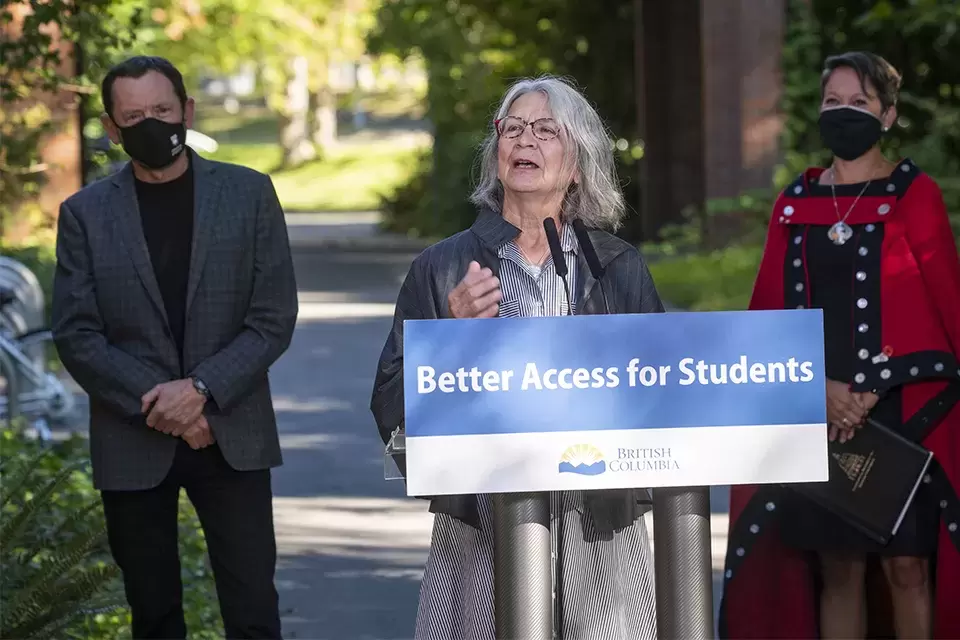The University of Victoria is proud to announce that it will soon begin expansion of its Law School to house the first of its kind in the world, National Centre for Indigenous Laws.
The $27.1 million project will be built thanks to funding from the governments of British Columbia ($13 million), Canada ($9.1 million) and the Law Foundation of BC ($5 million).
The new National Centre for Indigenous Laws will be home to the worlds’ first joint degree in Indigenous legal orders and Canadian common law and to the Indigenous Law Research Unit. Launched in 2018, the joint degree law program has 26 students of both Indigenous and non-Indigenous ancestry. It is anticipated that the program will reach its capacity of 100 full-time students over the next four years.
“The National Centre for Indigenous Laws will be home to the first Indigenous law program in the world to combine the intensive study of both Indigenous and non-Indigenous law, and will help Canada build a new nation-to-nation relationship based on the recognition – and renaissance – of Indigenous legal traditions,” statedJamie Cassels, president of UVic.
“This is an historic moment in history for the university,” said Melanie Mark, BC Minister of Advanced Education, Skills and Training. “We can make change when we work together and we can make change when we invest in stuff like this. Think of the investment that went into residential school.”
She noted that in 2019, the Declaration on the Rights of Indigenous Peoples Act passed unanimously in the B.C. legislature.
"When the Declaration on the Rights of Indigenous Peoples Act passed unanimously in the B.C. legislature in 2019, we voted for systemic change," said Mark. "The new National Centre for Indigenous Laws will be a place where the rights of Indigenous peoples in Canada will be recognized and upheld. This new space is being designed to allow for the unique ways in which Indigenous laws have been and are being practiced - incorporating ceremony and oral traditions - all within a culturally relevant space and expected to meet LEED Gold standards.”
The 2016 Truth and Reconciliation report listed 94 calls to action in order to redress the legacy of residential schools and advance the process of improving relations with Canada’s Indigenous peoples.
Number 50 in the report calls for equity for Aboriginal people in the legal system.
“In keeping with the United Nations Declaration on the Rights of Indigenous Peoples, we call upon the federal government, in collaboration with the Aboriginal organizations, to fund the establishment of Indigenous law institutes for the development, use and understanding of Indigenous laws and access to justice in accordance with the unique cultures of Aboriginal peoples in Canada,” states the TRC report.
Mark, the first female First Nations member of the Legislative Assembly of British Columbia and the first female First Nations cabinet minister, pointed out that in her lifetime she has seen changes in Canada’s laws with respect to Indigenous peoples.
“At one point in time Canada’s legal system was off-limits to Indigenous peoples, it was against the law for Indigenous people to become lawyers,” said Mark.
Today Indigenous Canadians can practice law and the National Centre for Indigenous Law could see the rise of a new generation of “briefcase warriors”, as she called them.
“This is a historic step toward reconciliation and will be a positive legacy for social, economic and environmental justice," Mark stated.
Federal Minister of Crown-Indigenous Relations Carolyn Bennet said Canada is proud to be part of this new initiative, stating that the center will project inclusion and diversity. She said that the government of Canada recognizes importance of the resurgence of Indigenous law and this is a step towards fulfilment of the calls to action.
Lindsay LeBlanc, representative of the Law Foundation of BC, said she is proud to support the vital work at UVic law and to support the resurgence of Indigenous law. She said the foundation is thankful that the federal and provincial governments stepped up and supported this project. She noted that much work needs to be done to research and recover long-suppressed Indigenous laws.
“The research and teachings at the center will play a vital role in helping to create are more just and inclusive Canada,” said Judith Sayers, Kekinusuqs, president of the Nuu-chah-nulth Tribal Council.







